#intellectuals
Quote
Some have to play the game because they cannot otherwise live, and those who could live otherwise are kept out because they do not want to play the game. It is as if the class from which independent intellectuals have defected takes its revenge, by pressing its demands home in the very domain where the deserter seeks refuge.
Theodor W. Adorno, Minima Moralia
128 notes
·
View notes
Text
SO I JUST SAW FALSETTOS LIVE FOR THE FIRST TIME
HOLY SHIT OKAY. HEY GUYS I JUST GOT BACK FROM SEEING FALSETTOS. LIVE. MY FAVOROITE MUSICAL EVER. I HAVE WORDS TO SAY.
So firstly I of course have to say this musical is fucking phenomenal and if u havent seen it even on youtube you HAVE to. onne of the best musicals ever wrutten. ignore any typos in this my hands r still shaking and im not editing htis. OKAY.
The actors. It was a college level production but the actors were so so talented. My favorite performances were from Mendel and Jason, who both pulled off their roles INCREDIBLY. Mendel was like a carbon copy of Brandon Uranowitz he had his mannerisms DOWN. All the nervous ticks, touching his face, being generally so awkward all the time, even his face was just perfec t for the role. And Jason was played by an adult femme-presenting person but they were so good as him!!!!! their voice fit him perfectly and she also perfectly encompassed Jason;s awkward childlike nature. The entire cast was incredible but those two really stood out to me!!!! Everyone's singing voices as well were fantastic, especially Trina's—she KILLED the high notes and even sung up the octave on a few lines !!!! including the "but still the bastard divorced me" and she still belted the "you must exorcise a devil" even AFTER Im Breaking Down. In fucking sane.
THAT BEING SAID THOUGH. Even though i enjouyed every second of it I do wanna make some more analysis-related directing critiques because im fucked up and evil about this show . im so sorry just let me speak here meaout. Stating right now though I've only seen the 2016 revival (about 2 dozen times) and not the original 90's version (been meaning to watch it just havent gotten the chance) so i reserve all TRUE judgement until after I see it!!! maybe some of these choices were in the original but tbh if they were i still like how the revival did it better. okay i swear im not just one of those ppl who is like "tHaTS noT hOw ThEY dId iT On BroADwAy" calm down. thanks <3
First of all. Some of the scenes lacked energy !!!!! Thrill of first love had no homoerotic choreography!!!!! they just kinda sat there on the couch looking morose and barely looking at each other as if they truly just hate each other and feel ANYthing towards each other anymore at all. But thats not the point!!!!!! They dont fully hate each other theyre just lacking the excitement that they once had and it's been replaced with nothing but disagreements and sex. When Whizzer and Marvin do their gay little dance theyre not just dancing and being gross and sexual theyre also FIGHTING!!!! they still care about each other they just dont know how to act!!!! and marvin's a bitch of course. Marvin was still very much a bitch. But because of the lack of energy in this song there was a bit of a lack of chemistry between the two as well, which carried through the whole show. I feel like it's important to see just how gross fucked up n nasty these two are about each other to see how its truly affecting the other people in Marvin's life. Even their chemistry during the chess game was lacking. They just kinda felt like they really hated each other. Which isnt the pointtttttt. Guh
Trina (or the directors idk) also made some choices I wasn't 100% on board with but they were more subtle. Mostly in her tone about Mendel. Up through Please Come To Our House she seemed to really really like Mendel. Like it was clear she was attempting to woo him. But then when he was proposing, and when they were maknig their home together, she just seemed. Unenthused. I know Trina truly doesn't really love her life, and just needs the stability of a nuclear family, but it was odd to see her not even attempt to keep up the facade on her own. Her and Mendel were similarly lacking in a lot of chemistry because of this, which, maybe to some of you makes sense but to me i do want to see them be close even if Mendel isn't absolutely the best.
LAST CRITIQUE OKAY. This one is BIG SPOILERS if u havent seen it yet but probably if ur reading this far youve already seen it okay. The fuckign bar mitzvah!!!!! There was no acknowledgement from Whizzer to Jason as he was reading his Torah !!!!!!! He just layed there in the hospital bed, facing AWAY from the audience so we could only see the very top of his head (which was on purpose for a quick change but) and he didnt get up at all to thank Jason or even acknowledge him :( for all the audience knows maybe he didnt even see Jason get bar mitzvahd. screaming crying throwing up.
OKAY IM DONE W BEING MEAN HERES A BIG CHANGE I REALLY LOVED !!!!!! as well as some smaller changes that i also really liked or were jsut neutral things i noticed
For most of act 2, up until Days Like This, They had this really cool circus imagery? Now once again idk if this is in the OG, but they had a picture of each cluster of characters set up on either side of the stage, and each of them was doing some sort of circus act both in the pictures and on stage, especially during A Day in Falsettoland. When a character was having their point in the song, they'd sometimes cut the lights briefly and suddenly the characters would be struggling to perform their little circus act, and each of them had a differnt one respectively and they all represented their immaturities/flaws/struggles:
Jason was on stilts, representing his need to grow up and perhaps his perceived mental maturity compared to the other characters
Trina was balancing/spinning plates on sticks, representing her need to keep balance and order in her life
Marvin + Whizzer were fencers because of their lingering animosity, yet newfound respect, for one another. Fencing isnt a dangerous sport, like you dont actually hurt your opponent in it, but it;s still a fight and youre still pointoing a weapon at them. guh. (AND BTW they did this during the racquetball scene and HOLY SHIT. I just gotta describe this one. Racquetball number 1 They had their little racquets as they were singing to each other but then when they got really into the game the lights would cut and then theyd be FENCING each other instead!!!!! and then the lights would cut again and itd go back to racquetball!!!! BUT THEN in the racquetball number 2 when it cut to them fencing ONLY MARVIN HAD A SWORD. WHIZZER STILL HAD HIS RACQUET. GIUUHUHGGHGHGHGHGH.;..,.,/;;'.';.;'[[[.)
Then the lesbians from next door were like a duo balancing/acrobatics act where they were always leaning on each other and picking each other up which was cute but also like. Charlotte would start falling in one direction and Cordelia would have to scrambke to catch her. I always hail them as the healthiest couple in the show but sometimes i forget they have problems too, like Cordelia;s insecurity and Charlotte's stress over the virus of course.
And finally Mendel!!!! was the fucking ringmaster!!!!! He had a hoop and a top hat and every time he was trying to calm down Jason (Everyone Hates His Parents), or Caroline, or Trina (A Day in Falsettoland), he would appear with his hoop and top hat, to show that HE is the one who needs to "control" other people's lives, or at least he feels the need to direct them. Mendel of course needs to feel like he's smarter than everyone else and like he's the only one who can help people. It really drove that home and it was an insane realization to come to. Phenomenal directing choice idk who came up with that but. bravissimo to you
Now miscellaneous stuff i liked or noticed!!!
They didn't have the big ol foam block. just some couch ends that they moved around to be diff pieces of furniture. If you've ever seen Waiting In The Wings' analysis on falsettos you might have seen a comment in the youtube section discussing how in the set design for the revival, the lack of real furniture through most of the show represents the lack of maturity of the characters, and as things get serious for them, more real props and set pieces get added. Like the chess board, the decor for Mendel + Trina's home, Whizzer's suitcase, the whole hospital room, etc. They didn't lean into that with this but i think that's fine! its not a necessary detail in my opinion and they did their best with what they had!!
Marvin didn't hand whizzer the suitcase after the chess game. He just grabbed it, and packed it himself. I was waiting for him to slam it into whizzer's chest or something. but no. Whizzer just picked it up and walked off. okay. Neutral bad change imo
Marvin's performances of What would I do and What more can i Say were. Breathtaking. Marvin actor if you're out there reading this your voice is lovely and carries so much emotion in your solo numbers. I Did Cry. a little bit
god their group number harmonies were AMAZING. All of the cast members' voices blended together so well and it was absolutely beautiful. the whole show was beautiful and i adored it i swear. I jsut need somwhere to put my feelings
THE ORCHESTRA FUCKED. IT FUCKED
Okay its getting late now and im fading quickly BUT IF U READ THIS FAR UR INSANE. This is for me and nobody else i just eneded to feelings dump. tl;dr: i fucking lvoe falsettos this was one of the best nights of my life i love you actors i love you pit i love you lighting i love you run crew i love you sound crew i love you musical theatre
#falsettos#falsettos 2016#musicals#musical theater#musical review#rambles#ramblings#shiksa caterer#short insomniacs#hypochondriacs#yiddish americans#spiky families#radiologist#intellectuals#nervous wrecks#sigh#falsettoland
64 notes
·
View notes
Quote
Intellectuals are doomed to disappear when artificial intelligence bursts on the scene, just as the heroes of silent cinema disappeared with the coming of the talkies. We are all Buster Keatons.
Jean Baudrillard, Cool Memories II
#intelligence#intellectuals#AI#artificial intelligence#quotes#Baudrillard#Jean Baudrillard#Cool Memories II
43 notes
·
View notes
Text
Response To Post On Intellectuals and Authoritarianism.
tmblrbye
It was creatives and intellectuals that pushed the whole of western society away from Monarchy and Aristocracy, into the present era of (yes totally compromised) democracies.
philosophicalconservatism
No it was not.
It was radical 18th century intellectuals who fomented the French Revolution and its bloody Reign Of Terror, on the basis of abstract ideological passion alone. This was abstract ideological passion not anchored or grounded in history or experience. Its result was anarchy followed by the replacement of a king with an emperor. It was not Democracy. By contrast, The American Revolution was not an endeavor by intellectuals to entirely reinvent a society from scratch, it was in fact an attempt to preserve a way of life that had organically evolved over time on the North American continent from an outside threat. It was therefore the antithesis of the French Revolution; an attempt to preserve not overthrow an existing order. This was why Edmund Burke, the father of political Conservatism supported the American Revolution but opposed the French.
Today intellectuals are at the forefront of the movement against free societies and in support of Socialist/Statist ideologies. And their opposition to American style liberal Democracy did not take long; their initial affection for the American Revolution died quickly. Fourier and Marx were attacking that system just a decade or two after the death of Jefferson. This was never what those utopian intellectuals had in mind.
42 notes
·
View notes
Photo
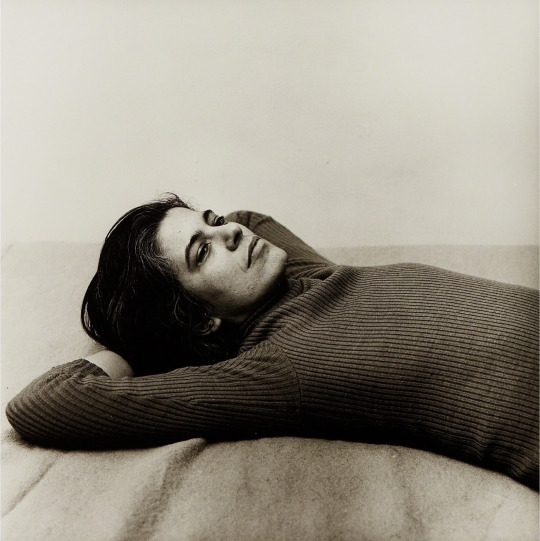
Peter Hujar
1934–1987
Susan Sontag, 1975
Gelatin silver print.
To overcome heartlessness, we must remember as an ethical act: Heartlessness and amnesia seem to go together. ~ Susan Sontag
#photography#Black and White#Susan Sontag#philsophy#photographie#writers#intellectuals#scholars#foto#fotografia#fotografie#thinking#dreaming#quotes#history
180 notes
·
View notes
Text
“There has long been a tendency in some intellectual circles to believe that the justice of a cause must be proportional to the lengths that people are willing to go to promote it. Only very desperate people, the argument goes, would do such things; therefore, since they do such things, they must be desperate.
The truth is otherwise. As one of the most efficient genocides in history-that of the Tutsi in Rwanda in 1994-proved, genocide can be fun. People in Rwanda hunted and killed their neighbors and then spent the evenings celebrating, feasting, singing, and dancing. They were happy with their day's work and couldn't wait to resume it. In fact, it was the time of their lives.
Intellectual support in the West for the Soviet Union was at its height when the regime was at its worst. Its atrocities were known and obvious. It was only when the Soviet Union moderated its repression and seemed to have lost the courage of its brutality that support for it in the West waned. Moscow was no longer a model for intellectuals that they deemed worthy of imitation once they had attained power. It had become grey and banal rather than vivid, exciting, and experimentally utopian.”
//Theodore Dalrymple
#violent Utopianism#communism#intellectuals#Theodore Dalrymple#human nature#desperate people#Tutsi#self justified#history#genocide#rwanda#causes#Soviet Union#utopianism
12 notes
·
View notes
Text
Mary Shelley’s Journal Entry from July 27th, 1816: she, Percy, and Claire return to Byron’s villa and to their child and nanny after visiting Mont Blanc.




“Saturday, July 27. — It is a most beautiful day, without a cloud. We set off at 12. The day is hot, yet there is a fine breeze. We pass by the Great Waterfall, which presents an aspect of singular beauty. The wind carries it away from the rock, and on towards the north, and the fine spray into which it is entirely dissolved passes before the mountain like a mist.
The other cascade has very little water, and is consequently not so beautiful as before. The evening of the day is calm and beautiful. Evening is the only time I enjoy travelling. The horses went fast, and the plain opened before us. We saw Jura and the Lake like old friends. I longed to see my pretty babe. At 9, after much inquiring and stupidity, we find the road, and alight at Diodati. We converse with Lord Byron till 12, and then go down to Chapuis, kiss our babe, and go to bed.”
#mary shelley’s 1816 journal#lake geneva 1816#lake geneva#diodati#villa diodati#lord byron#madame de staël#coppet castle#coppet house#coppet group#intellectuals#writers#frankenstein#lac leman#switzerland#summer#1816#journal#literature#english literature#diaries#percy shelley
19 notes
·
View notes
Quote
I feel the most affinity with Marriott’s writing when it illuminates blackness as a structural position, as an ontology rather than an identity or sociological experience, though the latter is usually what we mean when we say “race.” Too often our work is singularly focused on individual experience or relies on a Cartesian form of consciousness. Such work focuses on black people’s identities or stops at what black folks say about their experience without interrogating the conditions that make such speech possible and without interrogating the limits of consciousness itself. I worry that in this work, history and structure disappear. It is my view that the lives of black people of all genders are structured in the context of antiblack existential negation, but it is rare to have our position as shattered subjects theorized and even rarer for it to be theorized with deep attentiveness to gender and sexuality — as Marriott does. His scholarship speaks to the existential paradox of blackness, what I refer to as “existential negation” in this essay —namely, to have subjectivity while one’s subjecthood is constantly negated, one’s voice made inaudible by cultural fantasy, and one’s ego assailed by an Other that is inseparable from the self.[3] Marriott is known as an elegant theorist of psychoanalysis and culture. But I have been most struck by the ethics of his writing — in particular, by its ability to bring into focus the world’s collective disavowal of the violence subtending the production of blackness. This collective disavowal exists despite or because of the centrality of antiblackness for the production of the world’s sociality. The imagistic quality of the prose is the stuff of nightmares: the dread- inspiring quality of the unconscious life of race, a nightmarish vision of black men that has been imposed across the color line.
Zakiyyah Iman Jackson - Waking Nightmares—on David Marriott. [GLQ 1 June 2011; 17 (2-3): 357–363]
#zakiyyah iman jackson#david marriott#thinkers#intellectuals#theory#afropessimism#anti-blackness#subjectivity#othering#negation#psychoanalysis#blackness#existentialism
27 notes
·
View notes
Text

Well, perhaps I fell off the Dark Academia wagon today, I don't know. But I liked this outfit, whatever aesthetic it is, and I'm still the girl who loves all the same dark academic things, and that must count for something, right? What aesthetic would you call this outfit besides "Saturday Chic?" Lol. I really want to know, please comment below!
#what is my aesthetic#disability#dark academia#classic literature#light academia#service dog#dark academia aesthetic#dark academia vibes#books and reading#classic academia#dissociative identity disorder#complex ptsd#old money aesthetic#twee aesthetic#dead poets society#poetrycommunity#poets on tumblr#writers on tumblr#writers and poets#intellectuals
9 notes
·
View notes
Text
"I often talk about how, in today’s market, we find a whole series of products deprived of their malignant property: coffee without caffeine, cream without fat, beer without alcohol . . . And the list goes on: virtual sex as sex without sex, the art of expert administration as politics without politics, up to today’s tolerant liberal multiculturalism as an experience of the Other deprived of its disturbing Otherness. Los Prisonieros add another key figure from our cultural space to this series: the decaffeinated protester. This is a protester who says (or sings) all the right things, but somehow deprives them of their critical edge. He is horrified by global warming, he fights sexism and racism, he demands radical social change, and everyone is invited to join in the big sentiment of global solidarity—but all of this only adds up to mean that he is not required to change his life (maybe just to give to charity “here and there). He goes on with his career, he is ruthlessly competitive, but he is on the right side.”
From: Slavoj Žižek. “Heaven in Disorder”.
#zizek#left#academia#intellectuals#apolitical intellectuals#spinelessness#wokeism#honesty#los prisioneros
24 notes
·
View notes
Quote
The man of powerful intellect runs over with ideas; he scatters them by the handful. He is wretched if he cannot share them with others, cannot scatter them to the four winds, for in this is his life.
Peter Kropotkin, Anarchist Morality
#philosophy#quotes#Peter Kropotkin#Anarchist Morality#thinking#intellectuals#ideas#creativity#sharing#art#artists
190 notes
·
View notes
Text
Anonymous asked: You don’t hear much about leftist French intellectuals these days. In your considered opinion are they a spent force? Do you follow them?
Yes, I think you are correct. Not only are they a spent force but they are also intellectually and morally bankrupt. In many ways today’s french intellectuals are but a pale shadow of their past. Arguably, I think it’s a reflection in general of France’s relative decline (alongside other European countries) on the world stage as well.
But I should also say no, I think you are incorrect. Because bad ideas never die, they just get imported and recycled out of America. Unwittingly the woke are the heirs of these post-war French intellectuals.
No, I don’t follow them per se. But I do try to follow their arguments. I think it’s a mark of my intellectual curiosity to want to grapple with their ideas and try and see where they are coming from. That way if and when I reject an argument I know why I’m doing so rather than dismissively paint a broad brush caricature without even honestly engaging with their ideas.
There is no question French intellectual life conjures up potent imagery in the naive imaginations of some Anglo-Saxons, especially those on university campuses in both the US and Britain. The smell of Gauloises cigarettes and crowded Parisian cafés as well as pretty girls hanging on every word of the gnomic philosophe as he feels up their skirts and earnest bourgeois young men agitating for the next social revolution in turtle necks and Burberry scarves.
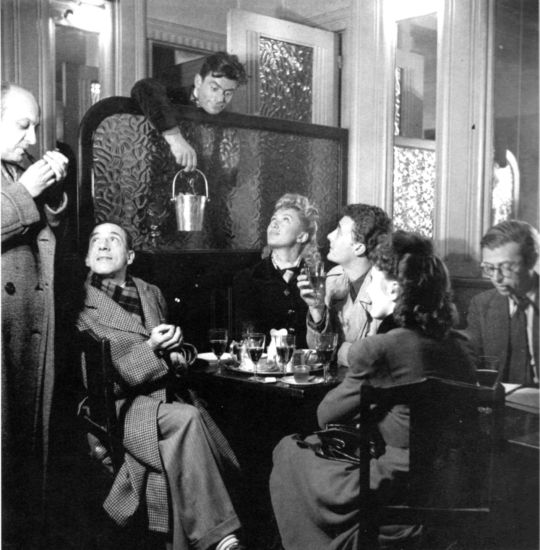
Philosophy really matters in France - and that actually is a good thing in experience. It has a central part in public life. It is taught to all schoolchildren. Anglophones know about René Descartes, the ‘Father of Modern Philosophy’ with his flowing locks and his cogito (“I think, therefore I am”). They know about Sartre, Simone de Beauvoir and Albert Camus and the stylish literary existentialism they created on the Left Bank in the years after the War. But they know precious little else. The ideas seem opaque and the writing incoherent but no one wants to say so for fear of being cast out of the herd.
Writing shortly after the end of the second world war, the French historian André Siegfried claimed (with a characteristic touch of Gallic aplomb) that French thought had been the driving force behind all the major advances of human civilisation, before concluding that “wherever she goes, France introduces clarity, intellectual ease, curiosity, and ... a subtle and necessary form of wisdom”. This ideal of a global French rayonnement (a combination of expansive impact and benevolent radiance) is now a distant and nostalgic memory.
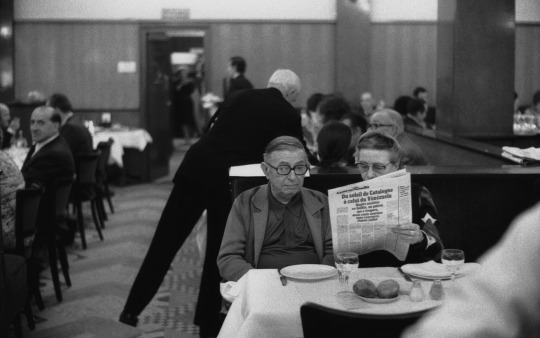
French thought is in the doldrums. French philosophy, which taught the world to reason with sweeping and bold systems such as rationalism, republicanism, feminism, positivism, existentialism and structuralism, has had conspicuously little to offer in recent decades. Saint-Germain-des-Prés, once the engine room of the Parisian Left Bank’s intellectual creativity, has become a haven of high-fashion boutiques, with fading memories of its past artistic and literary glory. As a disillusioned writer from the neighbourhood noted grimly: “The time will soon come when we will be reduced to selling little statues of Sartre made in China.”
To understand this lament one has to understand the particular place of French intellectualism have carved within cultural and political discourse in every day French society. Intellectuals in France are not just experts in their particular fields, such as literature, art, philosophy and history. They also speak in universal terms, and are expected to provide moral guidance about general social and political issues. Indeed, the most eminent French intellectuals are almost sacred figures, who became global symbols of the causes they championed - thus Voltaire’s powerful denunciation of religious intolerance, Rousseau’s rousing defence of republican freedom, Victor Hugo’s eloquent tirade against Napoleonic despotism, Émile Zola’s passionate plea for justice during the Dreyfus Affair, and Simone de Beauvoir’s bold advocacy of women’s emancipation.
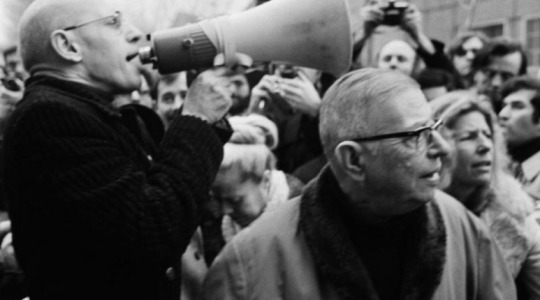
Above all, intellectuals have provided the French with a comforting sense of national pride. As the progressive thinker Edgar Quinet put it, with a big dollop of Gallic self-satisfaction: “France’s vocation is to consume herself for the glory of the world, for others as much as for herself, for an ideal which is yet to be attained of humanity and world civilisation.”
This French intellectualism has also manifested itself in a dazzling array of theories about knowledge, liberty, and the human condition. Successive generations of modern intellectuals - most of them schooled at the École Normale Supérieure in Paris - have hotly debated the meaning of life in books, newspaper articles, petitions, reviews and journals, in the process coining abstruse philosophical systems such as rationalism, eclecticism, spiritualism, republicanism, socialism, positivism, and existentialism.
This feverish theoretical activity came to a head in the decades after World War Two in the emergence of structuralism, a grand philosophy which underscored the importance of myths and the unconscious in human understanding. Its leading exponents were the philosopher of power and knowledge Michel Foucault and the ethnologist Claude Lévi-Strauss, both professors at the Collège de France. Because he shared the name of the famous brand of American garments, Lévi-Strauss received letters throughout his life asking for supplies of blue jeans.
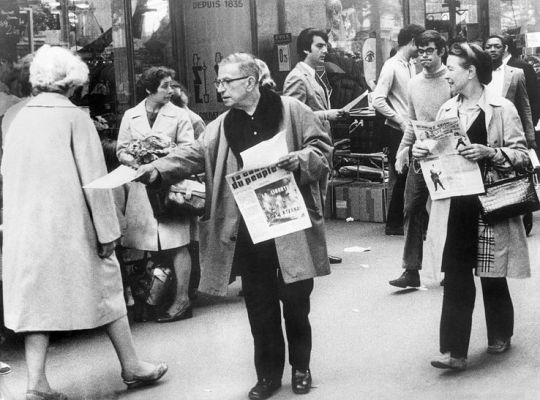
The ultimate symbol of the Left Bank intellectual was the philosopher Jean-Paul Sartre, who took the role of the public intellectual to its highest prominence. The intellectuel engagé had a duty to dedicate himself to revolutionary activity, to question established orthodoxies, and to champion the interests of all oppressed groups. Integral to Sartre’s appeal was the sheer glamour he gave to French intellectualism - with his utopian promise of a radiant future; his sweeping, polemical tone, and his celebration of the purifying effects of conflict; his bohemian and insouciant lifestyle, which deliberately spurned the conventions of bourgeois life; and his undisguised contempt for the established institutions of his time - be they the republican State, the Communist party, the French colonial regime in Algeria, or the university system.
As he put it, he was always a “traitor” - and this contrarian spirit was central to the aura which surrounded modern French intellectuals. And even though he detested nationalism, Sartre unwittingly contributed to the French sense of greatness through his embodiment of cultural and intellectual eminence, and his effortless superiority. Indeed, Sartre was undoubtedly one of the most famous French figures of the 20th century, and his writings and polemics were ardently followed by cultural elites across the globe, from Buenos Aires to Beirut.

But Sartre’s star dimmed once the truth came out. He looked either woefully naive or just in love with being close to power (depending on who you believe). It’s clear Jean-Paul Sartre’s political commitments were perverse and even imbecilic - this talented philosophe and littérateur defended the most vile tyrannies as long as they were left-wing. He saw authenticity and emancipation at work in Stalin’s murderous despotism, Castro’s brutal Caribbean tyranny and Mao’s terroristic assault on human freedom and the life of the mind. Most perversely of all, in the Critique of Dialectical Reason (1960), he provided a “philosophical” defence of “fraternity terror” as a means of overcoming inauthenticity and bourgeois individualism. The radical existentialist could only find fleeting moments of hope in the bloodlust of revolutionary terror. Roger Scruton rightly calls Sartre’s political choices and judgments “degraded”, owing as much to Robespierre as Marx.
Even his detractors can admit that Sartre was a writer of talent and a keen, if one-sided, observer of the human condition when he was not deformed by ideology. The same cannot be said of others like Althusser who degraded both political judgment and the very possibility of a thoughtful encounter with our humanity. “Structuralist” Marxism, à la Althusser, was not even particularly faithful to the Marxism of Marx.
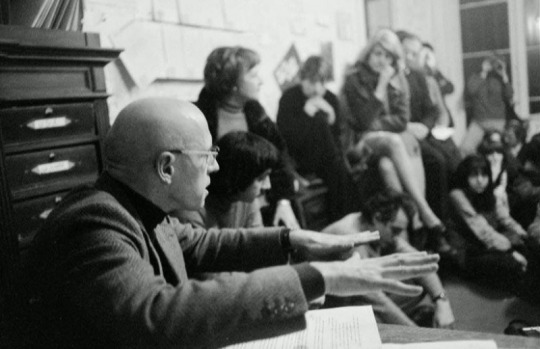
The Paris “nonsense machine”, as the late Roger Scruton bitingly called it, was committed to a reckless assault on common sense, moderation and decency. In addition, it displayed fierce hostility to even a residual conception of a (normative) human nature. To be sure, Michel Foucault had his moments of genius. But he shared, and radicalised, his generation’s obsession with sex and power relations, seeing domination everywhere, except in Tehran (in 1979) and in Mao’s China, where he perversely discerned avatars of liberation.
Today’s Left Bank is but a pale shadow of this past. Fashion outlets have replaced high theoretical endeavor in Saint-Germain-des-Près. In fact, with very rare exceptions, such as Thomas Piketty’s book on capitalism, Paris has ceased to be a major centre of innovation in the humanities and social sciences.
The dominant characteristics of contemporary French intellectual production are its superficial, derivative qualities (typified by figures such as Bernard-Henri Lévy) and its starkly pessimistic state of mind. The pamphlets which top the best-selling non-fiction charts in France nowadays are not works offering the promise of a new dawn, but nostalgic appeals to lost traditions of heroism, such as Stéphane Hessel’s “Indignez Vous!” (2010), and anti-immigration and self-pitying tirades echoing the message of Marine Le Pen’s Front National about the destruction of French identity.

Two recent examples are Alain Finkielkraut’s “L’Identité Malheureuse” (2013) and Eric Zemmour’s “Le Suicide Français” (2014), both suffused with images of degeneration and death. A more recent work in this vein had been Michel Houellebecq’s “Soumission” (2015), a dystopic novel which features the election of an Islamist to the French presidency, against the backdrop of a general disintegration of Enlightenment values in French society.
How is France’s loss of its bearings to be explained? Changes in the wider cultural landscape have had a major impact on Gallic self-confidence. The disintegration of Marxism in the late 20th century left a void which was filled only by postmodernism.
But the writings of the likes of Foucault, Derrida and Baudrillard if anything compounded the problem with their deliberate opaqueness, their fetish for trivial word-play and their denial of the possibility of objective meaning. The hollowness of postmodernism was brilliantly satirised in Laurent Binet’s biting novel, “La septième fonction du langage,” a murder mystery framed around the death of the philosopher Roland Barthes in 1980.
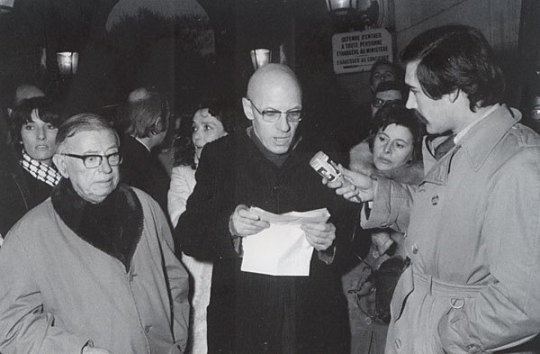
But French reality is itself far from comforting. The overcrowded and underfunded French higher education system is fraying, as shown by the relatively low global rankings of French universities in the Shanghai league table. The system has become both less meritocratic and more technocratic, producing an elite which is markedly less sophisticated and intellectually creative than its 19th and 20th century forebears: The contrast in this respect between Sarkozy and Hollande, who could barely speak grammatical French, and their eloquent and cerebral presidential predecessors was striking. Macron was an improvement as he was strongly influenced by Paul Ricoeur’s philosophy. But not much of an improvement, critics on both left and right would say.
Arguably the most important reason for the French loss of intellectual dynamism is the growing sense that there has been a major retreat of French power on the global stage, both in its material, “hard” terms and in its cultural “soft” dimensions. In a world dominated politically by the United States, culturally by the dastardly ‘Anglo-Saxons,” and in Europe by the economic might of Germany, the French have struggled to reinvent themselves.

Few of France’s contemporary writers - with the notable exception of Houellebecq - are well known internationally, not even recent Nobel-prize winners such as Le Clézio and Patrick Modiano. The ideal of Francophonia is nothing but an empty shell, and behind its lofty rhetoric the organisation has little real resonance among French-speaking communities across the world.
This explains why French intellectuals appear so gloomy about their nation’s future, and have become both more inward-looking, and increasingly turned to their national past: As the French historian Pierre Nora put it even more bluntly, France is suffering from “national provincialism.” It is worth noting, in this context, that neither the collapse of communism in the former Soviet bloc nor the Arab spring were inspired by French thought - in stark contrast with the philosophy of national liberation which underpinned the struggle against European colonialism, which was decisively shaped by the writings of Sartre and Fanon.
My view of French intellectuals - those on the left anyway - is not charitable at all as much I appreciate french culture. Like the Russian nihilists of old, the representatives of cultural repudiation set out to destroy the remnants of the natural moral law and all authoritative institutions necessary to free and civilised life.

Today, Alain Badiou is their self-parodic heir. This French “philosopher” combines secular messianic effusions about “the Event”, an eruption of revolutionary bliss and destruction, with apologies for Stalin and Mao. In the Chinese tyrant’s violent discourses during the murderous Cultural Revolution, Badiou finds the voice of philosophy at the service of the world-transforming Event.
As a British conservative it does intrigue me that French intellectual life has tended to adopt the ways and manners of the Jacobins. This is also true of right wing or conservative intellectuals down the ages. Even the exceptions – Chateaubriand, de Maistre, de Tocqueville, Maurras – have focused their attention on the standard of revolution, hoping to glimpse some strategy that would fortify their restorationist designs. And every movement away from the left – Ultramontanism, Action Franacise, Nouvelle Droite – has felt called upon to match the theoretical absolutism of its opponents. It has taken up the socialist challenge to present a rival system, a rival intellectual machine, with which to generate answers to all the problems of modern man.
No doubt this desire for ‘system’, and for universalist answers, shares some of the character of Roman Catholicism. But that is a discussion for another time.
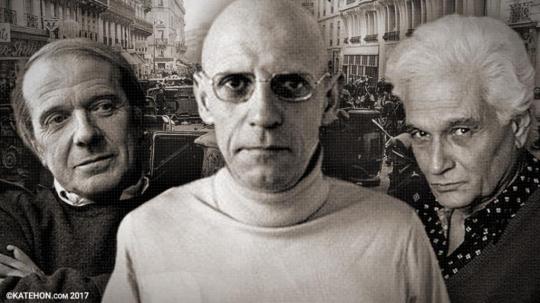
For many in the Western intellectual world, these iconic intellectual figures on the left - Sartre, Beauvoir, Delueze, Althusser, Foucault, Derrida etc - are the only intellectual France they know. Sophisticated nihilism is lauded by academics and literati throughout the world. Their legacy unwittingly has been taken on by the children of woke today. I’m pretty sure both Foucault and Derrida would have loved today’s social media because they embody the idea of the self as a performance.
The roots of being woke then lie with these French intellectuals. It was their ideas American leftists in academia gleefully took up as a mark of intellectual sophistication to hide their intellectual inferiority complex. They then proceeded to either misunderstand or misuse or take it the nth degree those very ideas to create their own toxic ideologies that plague Western culture today. Ironically they have gained little currency in France who across both the left and the right of the political spectrum have mercifully rejected wokeism as a purely American cultural import. If it’s American the knee jerk default position of the French (as a society) is to reject it. But time will tell how long the French can hold the barbarians at the gate.
There is much to admire about the French intellectual tradition and there are many intellectual and thinkers I would happily sit in a café and read (but never in the Left bank). But they tend to be classical thinkers whose wisdom is timeless such as Montaigne, Voltaire, de Tocqueville, or de Maistre.

I have a soft spot for Albert Camus too. Catherine Camus, the daughter of Camus put her finger on it when she said, “French intellectuals could never address themselves to the working classes. They don't know what it means, and that gives them a bad conscience about it. Albert Camus has a greater proximity to those in poverty.” The post-war French intellectuals on the left were very much the educated bourgeois whether they cared to acknowledge it or not, just like the woke today.
But these are all pre-modern thinkers (with the exception of Camus of course). There are modern conservative thinkers like Alain de Benoist and others with the Nouvelle Droite. And as interesting as they are, I don’t think they are in the same league as their intellectual French forebears.
Much of French conservative thought is alien to my English conservative way of thinking which is rooted in the ideas of Edmund Burke and Michael Oakeshott. But that is to be expected as conservativism by default seeks to conserve the traditions an customs of that specific society and can’t be transplanted abstractly onto another culture as say Marxism or Socialism can be (a sort of one size fits all).
Since the Dreyfus affair, the intellectual left reigned almost unchallenged in the life of ideas. This hegemony had become almost total after the war, following the discredit cast on conservative thought by the Vichy regime. Maurras is no longer necessary and Sartre crushes Camus. The great masters of thought were called Simone de Beauvoir, Maurice Merleau-Ponty, Claude Levi-Strauss, Roland Barthes, Michel Foucault. Only the centrists François Mauriac, Raymond Aron and Jean-François Revel were tolerated on an ideological folding seat.
That is, mercifully, no longer the case as I’ve tried to show.
I, for one, do not weep at their passing.

Thanks for your question.
#question#ask#french#intellectuals#intellectualism#ideas#ideology#culture#france#french intellectuals#europe#philosophy#marxism#socialism#woke#conservatism#burke#scruton#sartre#camus#deleuze#foucault#derrida#society
77 notes
·
View notes
Text
I hope these photos of James Baldwin and Nina Simone bring you as much joy as they did me
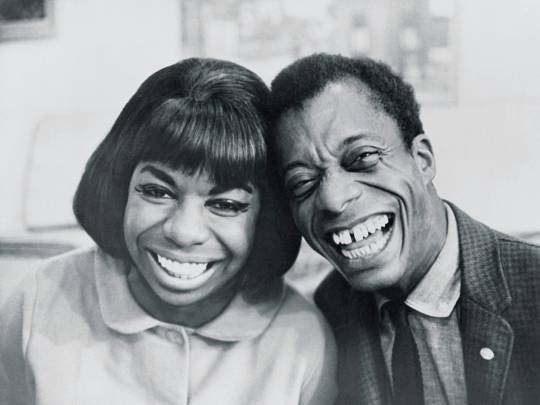

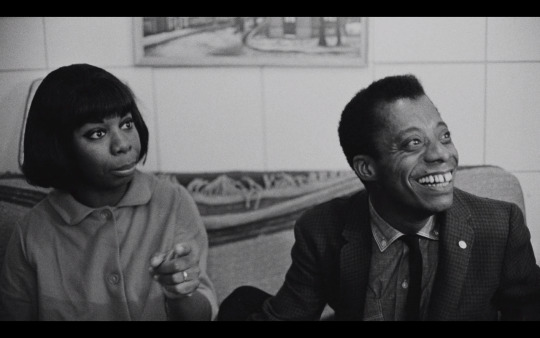
#nina simone#james baldwin#60s music#soul music#folk music#intellectuals#black and white#old photo#old photos#historical photos#american history#black history#music history
47 notes
·
View notes
Text
"The learned ignore the evidence of their senses to preserve the coherence of the ideas of their imagination."
Adam Smith (1723-1790) Scottish economist.
Smith exposing the dangers of ideology.
84 notes
·
View notes
Text

📍 shimla, himachal pradesh
"he looks like art, in the form of a poem."
Academia is a vast garden of knowledge, where scholars plant seeds of curiosity and nurture them with the waters of inquiry. Each discipline is a unique flower, blooming with intricate petals of understanding, while the pursuit of knowledge is akin to wandering through a dense forest, where every twist and turn reveals new pathways of insight. Within this ecosystem, professors are the guiding stars, illuminating the darkness with their wisdom, while students are the eager saplings, reaching towards the sky in search of enlightenment. In academia, the soil of innovation is tilled with the tools of critical thinking, and the harvest is a bounty of ideas that enrich the collective consciousness of humanity.
#academia#philosophy#wisdom#intellectuals#inference#understanding#light academia#dark academia#pinterest#beige
4 notes
·
View notes
